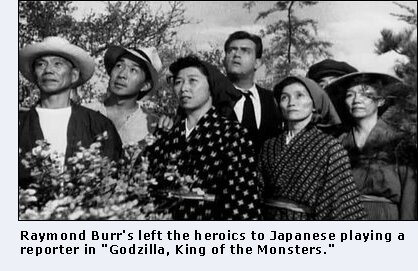


|
Definition: A known Hollywood actor, usually American, cast by Japanese, Italian, French and even British filmmakers to make their low budget movies marketable in the United States. History: A term of the late 1950s and 1960s in which “can” referred to “film can,” as in U.S. film distributors wouldn’t consider low budget foreign films (wouldn’t open their cans) unless they starred at least one recognizable Hollywood actor. Such an actor was Raymond Burr, albeit before Perry Mason fame, who was cast by Japanese producer Tomoyuki Tanaka to play Steve Martin in “Godzilla, King of the Monsters” (1956). Two years earlier, the American distribution of Tanaka’s all-Japanese “Godzilla” (1954) was limited to theaters in Japanese communities. Inserting Burr in a remake with the same dubbed Japanese actors opened the door to mainstream America. More amazing, Burr’s character merely reported the heroics of Japanese, an unlikely scenario for success a mere decade after VJ Day. Turned out most the film's fans were teen-agers too young to remember World War II or born after it—a demographic that so flocked to drive-ins that outdoor screens accounted for one-third of those in the U.S.A. by 1963. Moreover, these teen-agers went to drive-ins to do more than watch movies (see makeout movies). What better than a Japanese monster flick to guarantee no one in their parents’ generation would be around to catch them doing it. The most up-and-coming can opener was the baby-faced (see designer stubble) co-star of the TV series “Rawhide,” Clint Eastwood, who shot to stardom in Sergio Leone’s Spaghetti Westerns beginning with “A Fist Full of Dollars” (1964). Other notable can openers: Dana Andrews in the British film “Night of Demon” (1957), Nick Adams in the Japanese film “Frankenstein Conquers the World” (1965), Joan Fontaine in the English film “The Witches” (1966). Jane Fonda in the French film “Barbarella” (1968), Marlon Brando in the Italian film “The Last Tango in Paris” (1972). Related Terms: above the line, production value Ulmer Scale |
